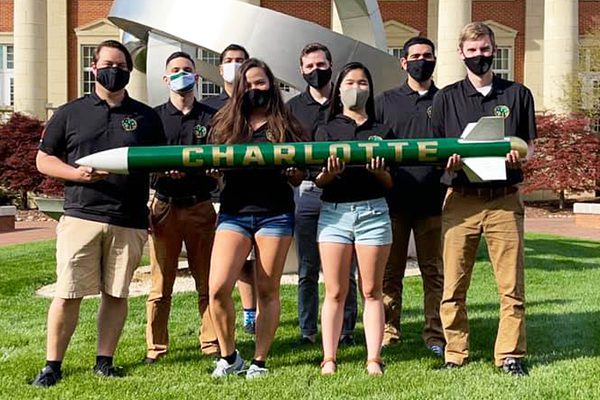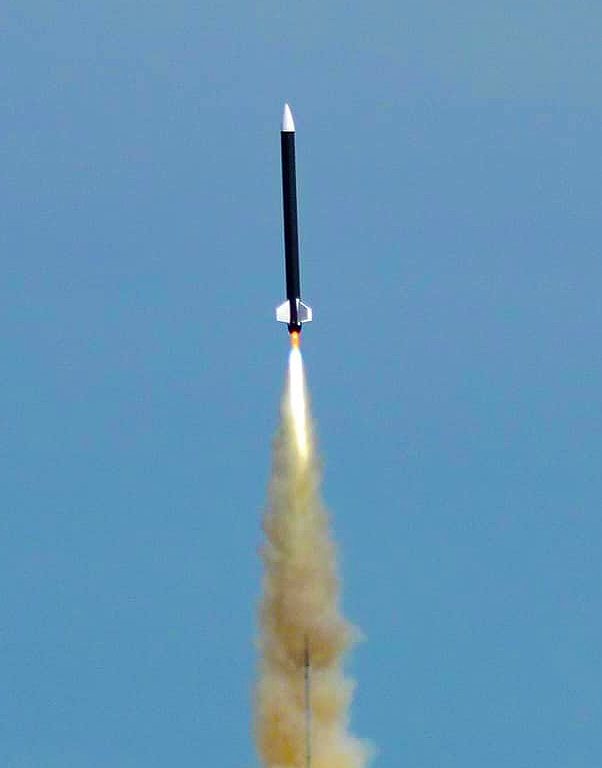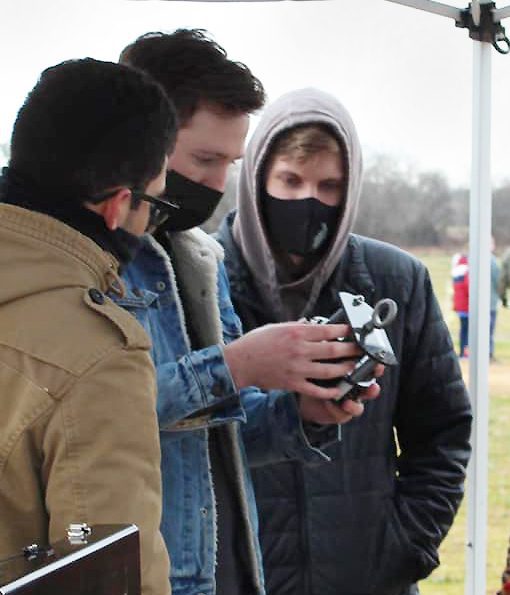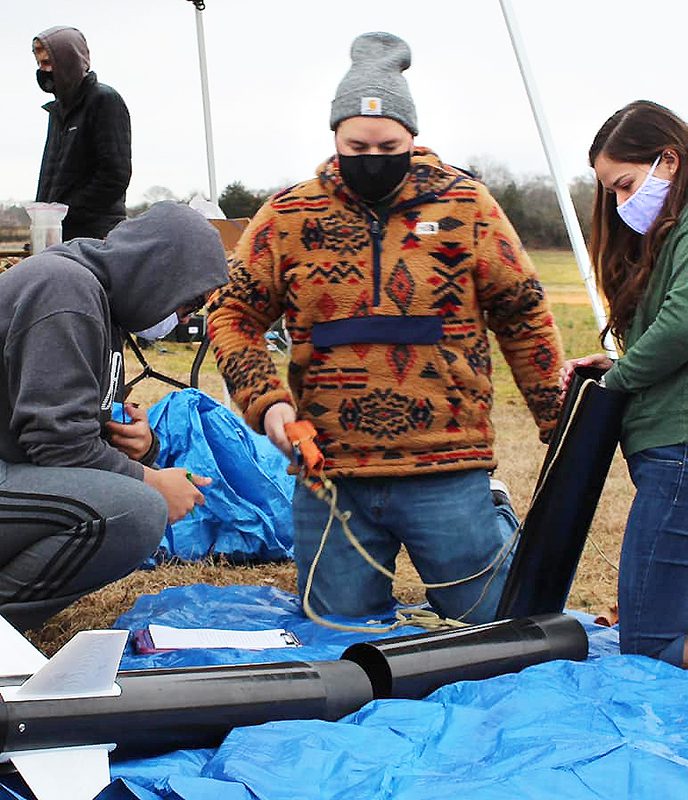49er Rocketry Team Wins NASA Launch Competition

The UNC Charlotte 49er Rocketry Team won first place overall in this year’s NASA Student Launch competition. The team of Computer Engineering, Electrical Engineering, Mechanical Engineering, and Mechanical Engineering Technology students placed first in both the payload and altitude portions of the competition, and third in safety.
Team’s competed remotely in the 2020-21 competition, and then submitted their designs, papers, finding and test results to NASA. Judges reviewed all of the data from the 46 teams, and announced winners during a virtual ceremony on June 3rd.
“This season wasn’t easy. It wasn’t normal. But you all succeeded despite the challenges. So, congratulations to all of you for seeing this mission to completion,” said NASA Administrator Sen. Bill Nelson during the ceremony. “This year’s challenge will hopefully serve as an inspiration for a lifetime of learning,” he said. “Someday it may be you designing a new spaceflight system or spacecraft or even a vehicle to land on another planet.”
 The student members of the 49er Rocketry Team for 2021 were:
The student members of the 49er Rocketry Team for 2021 were:
- Paphavee Glamsang, Computer Engineering
- Cortney Hahn, Mechanical Engineering Technology
- Jacob Joyner, Mechanical Engineering
- Jacob Loguillo, Mechanical Engineering
- Riley McBride, Mechanical Engineering
- Shyam Patel, Mechanical Engineering
- Andrew Rivera, Computer Engineering
- Alan Rodriguez, Electrical Engineering
UNC Charlotte’s faculty mentor for the 2021 team was Dr. Jerry Dahlberg of Mechanical Engineering and Engineering Science. “This year was very challenging year to compete,” Dr. Dahlberg said. “The team needed to complete all of the work that was expected during a normal year, but do it while maintaining social distancing and following all COVID-19 related safety protocols. The protocols severely affected the team’s ability to build, test and fly their prototypes. The team chose to stay in the Launch Division, which required them to build and fly their payload and rocket instead of doing a design-only project. The team did a great job and pulled it together to complete the project.”
The team lead for the 49ers was Riley McBride. “This was the smallest team we ever had,” he said, “so we all played a lot of different roles. But everyone worked well together, and obviously things worked out in the end.”
In the past few years, the 49er team finished second in the overall competition, always behind Vanderbilt. “It was a very good feeling to finally win the entire thing,” McBride said. “We put in a lot of hours this year, and it ended up being worth it.”
 For the past nine months, college, high school and middle school teams worked on the design, simulation, construction, testing and launching of rockets and payloads, as part of the 2021 Student Launch competition, one of NASA’s Artemis Student Challenges. In response to the COVID-19 pandemic, the competition was designed to allow for a virtual season. Teams were permitted to use multiple connections to attend all milestone review sessions, including the preliminary design, critical design and flight readiness reviews. Teams were not required to travel to Huntsville, Alabama, to complete the project and compete. Instead, they were permitted to complete their competition launch at a National Association of Rocketry or Tripoli Rocket Association-sanctioned launch in their respective local areas.
For the past nine months, college, high school and middle school teams worked on the design, simulation, construction, testing and launching of rockets and payloads, as part of the 2021 Student Launch competition, one of NASA’s Artemis Student Challenges. In response to the COVID-19 pandemic, the competition was designed to allow for a virtual season. Teams were permitted to use multiple connections to attend all milestone review sessions, including the preliminary design, critical design and flight readiness reviews. Teams were not required to travel to Huntsville, Alabama, to complete the project and compete. Instead, they were permitted to complete their competition launch at a National Association of Rocketry or Tripoli Rocket Association-sanctioned launch in their respective local areas.
This year, the college/university Launch Division’s payload mission was a lander that deployed from the rocket during descent. The lander had to land upright or contain a system to upright itself. The lander then leveled itself to within five degrees of vertical and took a 360-degree panoramic image of the location and transmitted the image back to the team.
The Top Overall teams in the Launch Division were:
- University of North Carolina at Charlotte
- Vanderbilt University
- University of Notre Dame
- Purdue University
- North Carolina State University
The Experiment Design (payload) Award in the Launch Division competition was presented to the teams with the most creative and innovative payload design while maximizing safety and science value. The top teams were:
- University of North Carolina at Charlotte
- Vanderbilt University
- Kent State University
The Altitude Awards were presented to the teams that came closest to their declared target altitude as recorded in their Flight Readiness Review. The top teams were:
- University of North Carolina at Charlotte (came within 16 feet of declared altitude)
- University of Notre Dame
- The University of Texas at Arlington
The Safety Awards were presented to teams that most successfully maximized safety and science value in their designs. The top teams were:
- University of Notre Dame
- North Carolina State University
- University of North Carolina at Charlotte
For over 20 years, NASA Student Launch has provided a realistic experience to students that resembles the development, test and operational lifecycle NASA and industry engineers use when developing and operating new hardware. It is one of the seven Artemis Student Challenges. More information about NASA’s Student Launch is here.
More photos and videos of the 49er teams launches and test are on the team Facebook page here.
